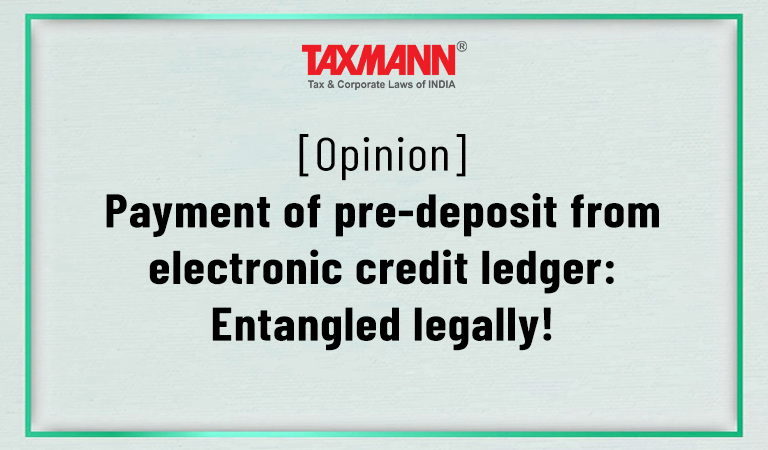[Opinion] Payment of pre-deposit from electronic credit ledger: Entangled legally!
- Blog|News|GST & Customs|
- 2 Min Read
- By Taxmann
- |
- Last Updated on 18 November, 2022

Dharnendra Kumar Rana, Ayush Agarwal & Akshay Agarwal – [2022] 144 taxmann.com 219 (Article)
Post Finance Act, 2014, requirement of making pre-deposit as a percentage of tax has been made mandatory for filing appeals by taxpayers under indirect tax laws. The objective behind such requirement is to abate litigation relating to stay proceedings, grant deemed stay from recovery and collect specified percentage of tax upfront in a uniform manner. Under the Central Goods and Service Tax Act, 2017 (‘CGST Act’) this requirement is enunciated under section 107 and 112, for filing appeal before the Appellate Authority and Appellate Tribunal respectively. However, the issue of payment of pre-deposit through electronic credit ledger (‘ECL’) under GST has been contentious. There are conflicting views from High Courts. The Department has also failed to clarify the issue, although the portal does not bar any such payment. In this article, the authors have discussed the judgments and the legal provisions surrounding the issue to examine the correct position of law.
Section 107 and section 112 of CGST Act provides that, no appeal shall be filed unless a sum equal to 10% / 20% of disputed amount of tax has been paid.
ECL is a ledger maintained on common portal wherein every claim of ITC under the CGST Act is credited. section 49(4) of the CGST Act limits the utilization of ECL for making payment towards output tax. section 2(82) of CGST Act defines ‘output tax’ as tax chargeable on taxable supply of goods or services or both but excludes tax payable under reverse charge basis. On combined reading of section 49(4) and section 2(82), it appears that scope of utilization of ECL is limited to payment towards output tax only. section 107 and section 112 uses the phrase ‘sum equal to percentage of tax’ and not ‘tax’ per se. Hence, it is necessary to analyze whether the pre-deposit is in the nature of output tax or is merely an amount.
Orrisa High Court in the case of Jyoti Construction v. Dy. Commissioner of CT & GST (‘Jyoti Construction’) did not accept that pre-deposit could be equated to ‘output tax’ as defined in section 2(82) of CGST Act. On the other hand, Bombay High Court in the case of Oasis Realty v. Union of India (‘Oasis Realty’), accepted that pre-deposit is in the nature of tax. The Court harped on the fact that expression used in section 107 is ‘paid’ and not ‘deposited’. In common parlance, tax is paid, and not deposited. Also, the provision states that specified percentage of tax has to be paid.
Click Here To Read The Full Article
Disclaimer: The content/information published on the website is only for general information of the user and shall not be construed as legal advice. While the Taxmann has exercised reasonable efforts to ensure the veracity of information/content published, Taxmann shall be under no liability in any manner whatsoever for incorrect information, if any.

Taxmann Publications has a dedicated in-house Research & Editorial Team. This team consists of a team of Chartered Accountants, Company Secretaries, and Lawyers. This team works under the guidance and supervision of editor-in-chief Mr Rakesh Bhargava.
The Research and Editorial Team is responsible for developing reliable and accurate content for the readers. The team follows the six-sigma approach to achieve the benchmark of zero error in its publications and research platforms. The team ensures that the following publication guidelines are thoroughly followed while developing the content:
- The statutory material is obtained only from the authorized and reliable sources
- All the latest developments in the judicial and legislative fields are covered
- Prepare the analytical write-ups on current, controversial, and important issues to help the readers to understand the concept and its implications
- Every content published by Taxmann is complete, accurate and lucid
- All evidence-based statements are supported with proper reference to Section, Circular No., Notification No. or citations
- The golden rules of grammar, style and consistency are thoroughly followed
- Font and size that’s easy to read and remain consistent across all imprint and digital publications are applied



 CA | CS | CMA
CA | CS | CMA
